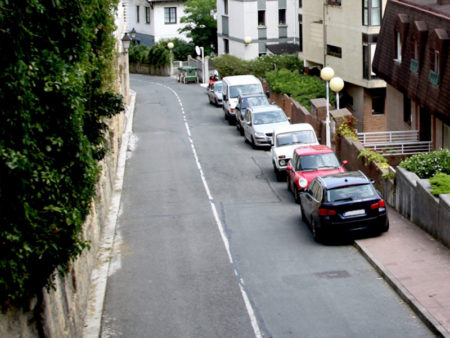Councils call for new powers to tackle ‘scourge’ of pavement parking
Powers to ban pavement parking should be extended to all areas across England, according to a new study from local councils.

The report warn that pavement parking presents a real hazard and potential danger to life
The report from the Local Government Association (LGA) says a change in the rules is long overdue, warning that pavement parking presents a real hazard and potential danger to life.
In England, pavement parking is currently only banned in London, where councils have powers to exempt certain roads. In Scotland, a nationwide parking ban has just started to be enforced by some councils and a consultation is also set to take place in Wales on introducing restrictions on pavement parking.
While the Government ran a 2020 consultation exploring a possible ban in England, it’s yet to take any action to tackle the “scourge” of pavement parking. That’s despite evidence that a ban would save lives and make our streets safer.
The independent report, produced by Sustrans and Transport for All and commissioned by the LGA, details the barriers faced by people using the footway and challenges for councils in making them accessible. This includes the lack of space commonly caused by pavement parking, poor surface quality, trip hazards and not enough places to cross the road safely.
Councils also warn of a lack of funding, difficulties in maintaining a clear picture of the condition of footways and bureaucratic hurdles in obtaining Traffic Regulation Orders.
As well as protecting older and vulnerable people from injury, the report says a ban would help councils meet national targets to encourage more walking and cycling. It also warns that poorer quality pavements can also lead to lower footfall at local businesses and injury claims from people tripping and falling. For those who are older or impaired, it could also lead to reduced independence, social isolation and exclusion, which could worsen their condition. Even where people are able to catch buses, the state of some pavements mean they are not always able to board or step off from them safely.
Councillor Darren Rodwell, transport spokesperson for the LGA, said: “Pavement parking is one of the biggest complaints from pedestrians, but three years on, councils outside of London still do not have the powers they need to tackle this scourge.
“Vulnerable and disabled people, including wheelchair users as well as parents with pushchairs are forced into the road due to some drivers’ inconsiderate parking, presenting a real hazard and potential danger to life.
“Repairing kerbs and pavements damaged by pavement parking is also expensive and this funding could be better used to resurface our roads and pavements, support local buses and provide more suitable parking.
“If we are to meet the Government’s ambition for half of all trips in England’s towns and cities to be walked, wheeled or cycled by 2030, then it makes sense to give councils across the country the same powers as in the capital, making our streets safer and footpaths open for everyone.”
The RAC has agreed that pavement parking is hazardous for pedestrians and those in wheelchairs but has questioned whether a full ban would be the most effective move.
Head of policy Simon Williams said: “Rather than an outright ban, we think it would be more effective if local authorities were given enforcement powers to prevent unnecessary pavement obstructions. This prevents the need for them having to survey all their roads to work out where exemptions need to be made, then spend money putting up signs and painting new markings.”
The LGA report on pavement parking is available here.












